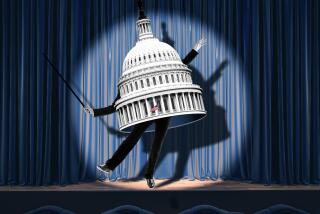News Flash to Washington: Americans Like the Arts : Culture: Polls show strong support for government leadership and assistance in all fields of creative endeavor.
The crisis in the arts and the humanities of the past dozen years is nearly over. The small band of detractors who wanted to censor all art, literature, film, television and scholarship touched by government support has been soundly defeated, in the courts, at the polls, in public opinion surveys. A decade of indifference to culture in the White House ought to be ending. A new Administration hospitable to the mind and the imagination is about to take power. Now is the time for a clean break, in policy, in rhetoric, in appointments, not for continued silence or for a return to the benign but outdated Democratic attitudes of the 1960s and 1970s.
The voters want decisive change. Polls of American attitudes toward the arts, education, censorship and innovation continually record impressive majorities in favor of free, unhampered expression, as well as wider dissemination of the arts in schools, museums and universities--and increased funding. It is totally wrong to believe that those who rail against the “cultural elite” speak for the American citizen. The latest Harris polls tell us that 69% of all Americans would pay an additional $5 in taxes to support the arts; 75% oppose government restrictions on content; 91% favor vigorous arts education in the schools. For Americans of the 1990s, the arts stand in the center of life, not on its margins or in its shadows.
The “new Democrats” are intertwined with these new Americans. Together they will certainly welcome--not fear--cultural risk and innovation, because daring often returns real jobs and tax revenues. A few thousand NEA dollars given to playwright Alfred Uhry to finish “Driving Miss Daisy” in Atlanta led to the production of a play that ultimately won a Pulitzer Prize, was sold to the movies and employed hundreds of actors, stagehands, ticket sellers, ushers and camera-persons, while grossing a profit of $300 million. As almost every mayor and city treasurer knows, the arts are job-intensive.
In cities like New York and Los Angeles, the arts and entertainment are a major industry, churning out billions for the economy each year, eclipsing manufacturing, personal computers and fashion. We must therefore begin to think of cultural funding as an investment, not as a charity, with tangible social and human benefits.
When taught with passion and commitment, the arts and humanities prepare students to imagine and create. Creative students become creative executives, scientists and inventors, as well as composers, choreographers, novelists, painters, video artists. Unless we can imagine new uses of computers, new forms for products, new content for new media--VCRs, cellular phones, satellite video, fiber-optic CATV and computer networks--we are finished as a global competitor. In a post- industrial international market, ideas, design, creativity are bread-and-butter words.
Looked at this way, the stubborn American refusal to dole out more than pennies per capita to the arts is virtually suicidal. While each of us pays close to $1,000 per year in tax dollars for the defense budget, our individual outlay in the arts is a mere 68 cents. Compare this with the tough-minded outlays provided by Canadians ($32 each), the French ($32) and the Swedes ($35). At a minimum, the new Administration and Congress should immediately restore the NEA and NEH budgets to the levels that existed before the Reagan-Bush slowdown in 1980, which allowed annual inflation to reduce the purchasing power of static budgets.
Given the NEA and NEH track record of return on investment, these additional dollars would produce more art, more books, more concerts, more plays for more communities, touching the inner cores of cities as well as suburbs, small towns and rural regions. Artists, writers, art teachers could visit every school, not just the privileged few. Many more of our best creators could do their real work, pay their bills and feed their families, than now.
For Democrats freshly skeptical of state power, any cultural policy that liberates our boldest talents to pursue individual goals beyond bureaucratic control ought to be welcome. This is precisely why the President now needs to speak out on this issue, to appoint men and women of vision, grounded in the disciplines they represent, as the chairpersons of the NEA and NEH. Then we will know that American culture matters as much to our government as it matters to its citizens, and to the world.
More to Read
The biggest entertainment stories
Get our big stories about Hollywood, film, television, music, arts, culture and more right in your inbox as soon as they publish.
You may occasionally receive promotional content from the Los Angeles Times.










